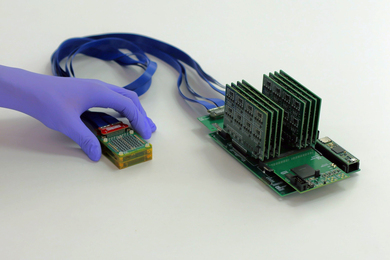A Media Lab composer and a team from MIT and the Berklee School of Music are using new musical technologies at a celebration of Tewksbury State Hospital's 150th anniversary on Saturday, May 1.
Professor Tod Machover of the Program in Media Arts and Sciences, is known for his innovations in composing and performing music. "Toy Symphony," his presentation of works and performances by young children, has been produced in cities around the world (see MIT Tech Talk, April 30, 2003).
To help bridge the gap between trained musicians and others, Machover and his team created Hyperscore, an electronic sketchpad in which color-coded lines drawn freehand on a screen translate into chords, melodies and other sounds. These lines can then be transcribed into notations for traditional musicians to play.
The Tewksbury State Hospital event, which is free and open to the public, will feature a concert by the Lowell Philharmonic playing selected pieces by patients in the hospital's mental health and physical disabilities divisions. Machover's team taught the patients, aged 20 to 80, to compose their own works on Hyperscore.
Machover has been delighted with the process and with the results. "The obstacles are huge--some patients can hardly move their bodies, and others are shy and withdrawn--but each workshop has been a joy, and the work that is being created is beautiful and intricate and powerful, and is quite simply interesting and worthwhile by any standard," he said.
The Tewksbury project began in March thanks to Machover's recent involvement with a new field--music, mind and health--and to a call from the Massachusetts Cultural Council's New Pathways to Health project.
For Machover, some of the pleasure in the project has been to see his dream--a sort of ultimate democracy among music-makers--realized through technology.
"The beauty of Hyperscore is that it's easy to learn and use and lets us quickly get to discussing the music that's developing. Then we can ask, 'What are you trying to do? Does that sound keep your interest? What is the story or mood you are trying to achieve?' It's how we would converse with graduate composition students," he said.
A version of this article appeared in MIT Tech Talk on April 28, 2004.





